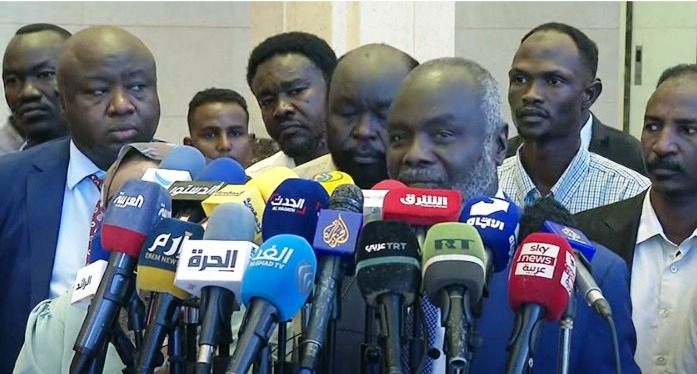UAE is no longer a Quad member, says Sudan’s JEM leader
September 7, 2022 (KHARTOUM) – Gibril Ibrahim Chairman of the Justice and Equality Movement (JEM), leading figure of the National Consensus Forces (NCF), revealed Wednesday the withdrawal of the United Arab Emirates (UAE) from the Quad, which seeks to bridge the gaps between the Sudanese parties to end the protracted political crisis.
Ibrahim held a press conference on Wednesday to call on behalf of his coalition to create a national committee for the intra-Sudanese dialogue, considering that the Tripartite Mechanism would only facilitate the political process.
“The UAE withdrew early from the Quad mechanism, and now it has become a tripartite body that includes the United Kingdom, Saudi Arabia and the United States of America,” he told reporters.
“An NCF delegation met the new US ambassador to brief him about the political crisis in the country,” he further said.
He did not elaborate on the reasons that led to the withdrawal of the UAE, which is perceived as a supporter of the military component.
The UAE’s economic ambitions in Sudan have also been rejected by several political groups, such as building a new terminal on the Red Sea or agricultural schemas in eastern Sudan.
The Gulf country, which has a blacklist for Islamist groups, is also not welcomed by Sudanese Islamist groups that aspire to participate in the transitional process.
The Emirates, where live former Prime Minister Abdallah Hamdok and several influential Sudanese businessmen, are also seen as planning to play a role in the political future of the country.
Ibrahim said the national committee will gather all the initiatives proposed by the political forces and combine them in one draft constitutional declaration that would be debated by the political forces before forming a transitional government.
In addition, he renewed their call for an inclusive national dialogue that gathers all political forces except the banned National Congress Party.
“The NCP is legally dissolved and does not exist. So, we are not talking about it. All the other political forces in the country have the right to be a party to any dialogue to determine the fate of the country,” he said.
The JEM leader underscored that it would not be easy to bring all the parties to fully agree on a text, but the most important is to achieve a compromise between the parties.
“We believe that is possible because the differences between the existing proposals are not so far. Any party that fails to join in the consensus would remain where it is,” he emphasized.”
The NCF, which supported the coup of October 2021, are at odds with the Forces for Freedom and Change on the participation of the military component in the transition.
Also, they are accused of being in cahoots with the military to obstruct the role of the UNITAMS, which together with the international community called for a “credible” intra-Sudanese process leading to forming a transitional government.
Recently, NCF Secretary General Mubarak Ardol strongly criticized the Quad as he accused them of backing FFC plans to exclude a large portion of the political and social forces.
After that, he directed his criticism directly to the Saudi Ambassador who hosted and organized meetings between, the military component and FFC groups and recently tried to convene a similar meeting with the participation of Minni Minnawi and Gibril Ibrahim.
Meanwhile, Minni Minnaw, Head of the NCF Liaison Committee and SLM leader, met with the U.S. Ambassador John Godfrey to discuss the political situation and the ongoing efforts to form a transitional government.
In a tweet posted after the meeting, Minnawi said they had a productive discussion.
” Our discussion aimed to form a quick civilian government through comprehensive dialogue that shouldn’t exclude any,” he said.
For his part, Godfrey stressed they discussed “The need for an inclusive political dialogue”.
(ST)

